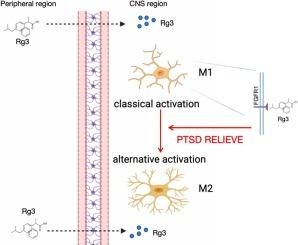人参皂苷通过FGF/FGFR1重编程小胶质细胞抑制创伤后应激障碍。
IF 4.7
2区 医学
Q2 IMMUNOLOGY
引用次数: 0
摘要
创伤后应激障碍(PTSD)是一种严重的顽固性精神疾病。目前,临床上对创伤后应激障碍患者的治疗主要以药物治疗为主,辅以心理治疗。然而,治疗效果并不理想。如何治疗创伤后应激障碍患者迫在眉睫。在这里,我们发现人参皂苷可以明显缓解小鼠模型的创伤后应激障碍症状。人参皂苷的主要药理成分之一Rg3通过促进替代活化的M2表型小胶质细胞,同时抑制经典活化的炎性M1表型小胶质细胞,从而预防创伤后应激障碍。从机理上讲,Rg3 能上调小胶质细胞中成纤维细胞生长因子受体 1(FGFR1)的表达,从而抑制小胶质细胞的过度活化,减少神经元凋亡。重要的是,敲低 BV2 细胞中的 FGFR1 表达会促进 BV2 细胞的促炎表型,而过度表达 FGFR1 则会逆转这种效应。体内创伤后应激障碍小鼠模型结果显示,敲除 FGFR1 会阻止 Rg3 的治疗效果,这表明 FGFR1 是创伤后应激障碍的一个重要靶点。我们的研究结果表明,Rg3可能是治疗创伤后应激障碍患者的一种潜在药物。本文章由计算机程序翻译,如有差异,请以英文原文为准。

Ginsenoside reprogramming microglia through the FGF/FGFR1 inhibits post traumatic stress disorder
Post traumatic stress disorder (PTSD) is a serious and persistent mental diseases. Nowadays, Treatment of PTSD patients in clinical practice is mainly based on drug therapy accompanied by psychological therapy. However, the therapeutic effect is unsatisfactory. It is urgent to detect how to treat PTSD patients. Here, we found that ginsenoside can significantly relieve PTSD symptoms in mice model. Rg3, one of the main pharmacological components of ginsenoside, prevents PTSD by promoting alternatively activated M2 phenotype microglia while inhibiting classically activated inflammatory M1 phenotype microglia. Mechanistically, Rg3 up-regulates fibroblast growth factor receptor 1 (FGFR1) expression in microglia to suppress excessive activation of microglia and reduce neuronal apoptosis. Importantly, knocking down FGFR1 expression in BV2 cells promoted a pro-inflammatory phenotype of BV2 cells, while over-expressing FGFR1 reversed this effect. In vivo PTSD mice model results showed that knockdown FGFR1 prevents the therapeutic effect of Rg3, which indicates that FGFR1 is an essential target of PTSD. Our results reveal that Rg3 may be a potential drug to treat PTSD patients.
求助全文
通过发布文献求助,成功后即可免费获取论文全文。
去求助
来源期刊
CiteScore
8.40
自引率
3.60%
发文量
935
审稿时长
53 days
期刊介绍:
International Immunopharmacology is the primary vehicle for the publication of original research papers pertinent to the overlapping areas of immunology, pharmacology, cytokine biology, immunotherapy, immunopathology and immunotoxicology. Review articles that encompass these subjects are also welcome.
The subject material appropriate for submission includes:
• Clinical studies employing immunotherapy of any type including the use of: bacterial and chemical agents; thymic hormones, interferon, lymphokines, etc., in transplantation and diseases such as cancer, immunodeficiency, chronic infection and allergic, inflammatory or autoimmune disorders.
• Studies on the mechanisms of action of these agents for specific parameters of immune competence as well as the overall clinical state.
• Pre-clinical animal studies and in vitro studies on mechanisms of action with immunopotentiators, immunomodulators, immunoadjuvants and other pharmacological agents active on cells participating in immune or allergic responses.
• Pharmacological compounds, microbial products and toxicological agents that affect the lymphoid system, and their mechanisms of action.
• Agents that activate genes or modify transcription and translation within the immune response.
• Substances activated, generated, or released through immunologic or related pathways that are pharmacologically active.
• Production, function and regulation of cytokines and their receptors.
• Classical pharmacological studies on the effects of chemokines and bioactive factors released during immunological reactions.

 求助内容:
求助内容: 应助结果提醒方式:
应助结果提醒方式:


